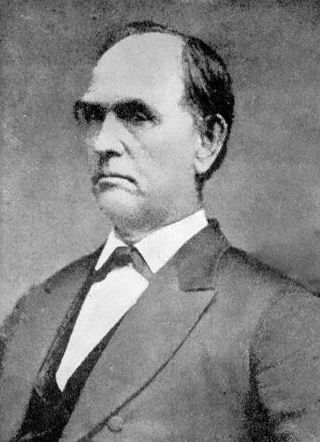
Augustus Caesar Dodge was a Democratic delegate to the U.S. House of Representatives from Iowa Territory, a U.S. minister to Spain, and one of the first set of United States senators to represent Iowa after it was admitted to the Union as a state. His father, Henry Dodge, served as a U.S. senator from Wisconsin; the two were the first and so far the only father-son pair to serve concurrently in the Senate, which they did from 1848 to 1855.

The Territory of Iowa was an organized incorporated territory of the United States that existed from July 4, 1838, until December 28, 1846, when the southeastern portion of the territory was admitted to the Union as the state of Iowa. The remainder of the territory would have no organized territorial government until the Minnesota Territory was organized on March 3, 1849.

The Territory of Wisconsin was an organized and incorporated territory of the United States that existed from July 3, 1836, until May 29, 1848, when an eastern portion of the territory was admitted to the Union as the State of Wisconsin. Belmont was initially chosen as the capital of the territory. In 1837, the territorial legislature met in Burlington, just north of the Skunk River on the Mississippi, which became part of the Iowa Territory in 1838. In that year, 1838, the territorial capital of Wisconsin was moved to Madison.
Since Iowa became a U.S. state in 1846, it has sent congressional delegations to the United States Senate and United States House of Representatives. Each state elects two senators to serve for six years, and members of the House to two-year terms. Before becoming a state, the Iowa Territory elected a non-voting delegate at-large to Congress from 1838 to 1846.
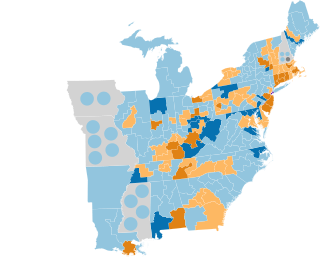
The 1844–45 United States House of Representatives elections were held on various dates in various states between July 1, 1844, and November 4, 1845. Each state set its own date for its elections to the House of Representatives. 224 elected members representing 27 states took their seats when the first session of the 29th United States Congress convened on December 1, 1845. The new state of Florida elected its first representative during this election cycle, while one vacancy in New Hampshire's delegation remained unfilled for the duration of the 29th Congress.
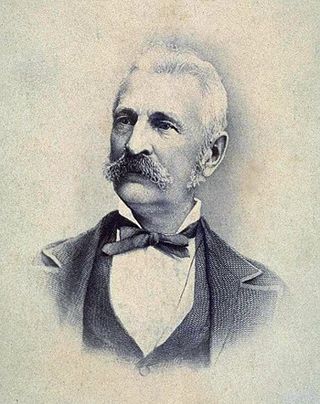
Serranus Clinton Hastings was an American politician, rancher and lawyer in California. He studied law as a young man and moved to the Iowa District in 1837 to open a law office. Iowa became a territory a year later, and he was elected a member of the House of Representatives of the Iowa Territorial General Assembly. When the territory became the state of Iowa in 1846, he won an election to represent the state in the United States House of Representatives. After his term ended, he became Chief Justice of the Iowa Supreme Court.

Augustus Hall, a lawyer, was a one-term Democratic U.S. Representative from Iowa's 1st congressional district, and chief justice of the Nebraska Territory.
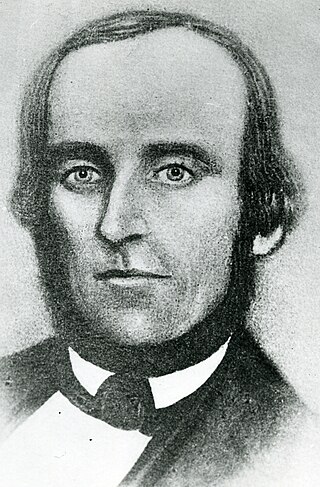
James Clarke was the third Governor of Iowa Territory from November 18, 1845 until December 3, 1846, being appointed to the office, as a Democrat, by President James Polk. Born in Greensburg, Pennsylvania, Clarke was secretary of Iowa Territory from 1839–1841 and mayor of Burlington, Iowa from 1844-1845. Clarke was the son-in-law of Henry Dodge, whom Fort Dodge, Iowa, is named in his honor. Clarke County, Iowa was named after James Clarke. He died in Burlington.

Clinton County Courthouse is located in Clinton, Iowa, United States. It was built in 1897 and added to the National Register of Historic Places July 2, 1981, as a part of the County Courthouses in Iowa Thematic Resource. It is the fourth courthouse that has been used by the county.
Slavery occurred in Iowa prior to 1846, but the extent and significance of slavery in pre-state Iowa is poorly understood. Little is known about slavery in Iowa prior to the Louisiana Purchase. The area that is now the American state of Iowa was part of New France when first settled by Europeans. As such, it was governed by its slavery laws. French settlers first brought African slaves into Upper Louisiana from Saint-Domingue around 1720 under the legal terms of the Code Noir, which defined the conditions of slavery in the French empire and restricted the activities of free Black persons.
Leander Chapman was the Speaker of the Michigan House of Representatives in 1849.

In the 1838 Iowa Territory Council elections, electors selected councilors to serve in the first Iowa Territory Council. All 13 members of the Territory Council were elected. Councilors served one-year terms.

In the 1839 Iowa Territory Council elections, electors selected councilors to serve in the second Iowa Territory Council. All 13 members of the Territory Council were elected. Councilors served one-year terms.

In the 1840 Iowa Territory Council elections, electors selected councilors to serve in the third Iowa Territory Council. All 13 members of the Territory Council were elected. Councilors served one-year terms.

In the 1841 Iowa Territory Council elections, electors selected councilors to serve in the fourth Iowa Territory Council. All 13 members of the Territory Council were elected. Councilors served one-year terms.

In the 1842 Iowa Territory Council elections, electors selected councilors to serve in the fifth Iowa Territory Council. All 13 members of the Territory Council were elected. Councilors served one-year terms.
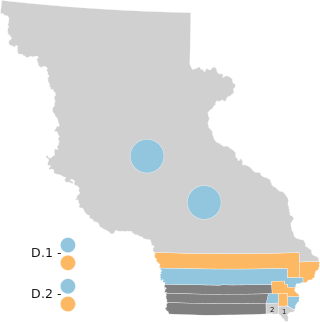
In the 1843 Iowa Territory Council elections, electors selected councilors to serve in the sixth Iowa Territory Council. All 13 members of the Territory Council were elected. Councilors served one-year terms.

In the 1844 Iowa Territory Council elections, electors selected councilors to serve in the seventh Iowa Territory Council. All 13 members of the Territory Council were elected. Councilors served one-year terms.

In the 1845 Iowa Territory Council elections, electors selected councilors to serve in the eighth and final Iowa Territory Council before Iowa attained statehood in 1846. All 13 members of the Territory Council were elected. Councilors served until the organization of the Iowa General Assembly in 1846 as the legislative branch of the new state of Iowa.

In the 1846 Iowa State Senate elections, Iowa voters elected state senators to serve in the first Iowa General Assembly. Elections were held for all 19 members of the State Senate. In the newly created Senate, members were to serve four-year terms. Members of the first General Assembly were classified into two groups. Nine of the newly elected senators would serve full four-year terms, while 10 drew short terms of two years and were up for re-election in 1848. This classification process began the rotation system whereby half the members of the Senate are elected biennially for full four-year terms.




















